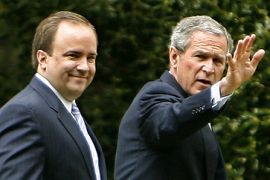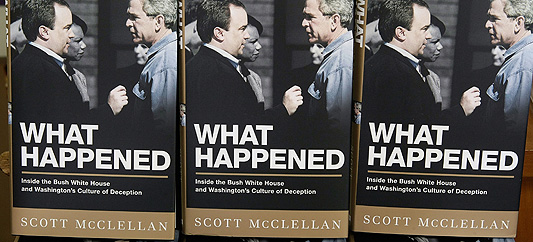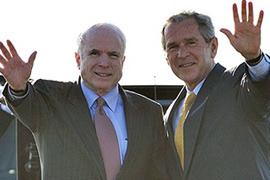US election diary: Cashing in
Why a tell-all book on the Bush administration is a case of too little, too late.

 |
| There is little in McClellan’s book on the White House to surprise observers [GALLO/GETTY] |
Scott McClellan might have better served the American people by speaking out about the mistakes and blunders he witnessed in the Bush White House as they happened, rather than waiting several years and then turning a profit with a tell-all book.
But that would have required McClellan, who press secretary for George Bush, the US president, to resign, and honorable resignation is no longer part of the American political tradition.
Alas, the most recent resignation for the sake of honour by a high-level American official was back in April, 1980.
That is when Cyrus Vance, Jimmy Carter’s secretary of state, quit to protest the botched hostage rescue attempt in Iran.
And let us not forget the principled Michigan newsman Jerald terHorst, who quit as Gerald Ford’s press secretary the day Ford pardoned Richard Nixon.
Scott McClellan could have used a bit of terHorst’s testicular fortitude.
‘Miserable creatures’
| Previous entries |
|
|
In recent years, it seems, US officials prefer to stay on the payroll, follow orders, implement criminally stupid policies, and then only much later tattle on their bosses for money.
Bitter Bob Dole, the Republican’s 1996 presidential nominee, emerged from whatever dark place he lurks in and lashed out at McClellan with characteristic vitriol.
“There are miserable creatures like you in every administration who don’t have the guts to speak up or quit if there are disagreements with the boss or colleagues,” Dole wrote in an open letter to McClellan.
“No, your type soaks up the benefits of power, revels in the limelight for years, then quits and – spurred on by greed – cashes in with a scathing critique.”
Ouch.
It was amusing to see the Bush loyalists rush out to attack McClellan, all armed with their identical talking points.
They were “sad”, the book was “puzzling”, it “didn’t sound like Scott” and, oh by the way, he was just a low level drone who was out of the loop, anyway. And his nasty book is proof he is “disgruntled”.
‘Political propaganda’
| McClellan describes Bush as out of touch and intellectually incurious, stubborn, unwilling to admit mistakes, not prone to introspection or self doubt |
But really, was there anything in McClellan’s book came as a big surprise? Here are some of the blockbusters:
“Top Bush aides had outlined a strategy for carefully orchestrating the coming campaign to aggressively sell the war,” McClellan writes, calling it “a political propaganda campaign”.
Is that news? Not to anyone who looked at the facts and compared them to the president’s rhetoric.
He also faults the White House press for passively accepting administration spin, calling reporters “complicit enablers”.
Check. No surprise there, folks.
McClellan says the Bush administration operated in permanent campaign mode, in which every policy decision was made based on political calculation.
Wow. No kidding.
McClellan describes Bush as out of touch and intellectually incurious, stubborn, unwilling to admit mistakes, not prone to introspection or self doubt.
Oh, come on. Does anyone think Bush agonises over his blunders?
‘Permanent campaign’
This idea of a “permanent campaign”, while not new, is worth exploring a bit further.
Richard Nixon was the first modern president to make the business of governing the country indistinguishable from running for re-election.
Just about every Nixonian decision was aimed at creating a divisive political atmosphere that he could exploit to his advantage.
But eventually he outsmarted himself, broke the law, and resigned in disgrace (not the kind of resignation I was writing about in the first part of this diary!).
Bill Clinton, too, was always running, running, running. He famously used a focus group to determine whether it would be more politically advantageous for him and his family to vacation on upper-crusty Martha’s Vineyard or on a rugged National Park out west.
The focus group ruled the Clintons must camp out, so they spent a miserable couple of days in a tent on the prairie.
But the Bush gang carried government by permanent campaign to a new level.
War president
| In focus |
 In-depth coverage of the US presidential election |
I am convinced that the decision to go to war in Iraq was basically a political one.
Fully realising Bush lost the popular vote to Al Gore in 2000 by nearly half a million votes, Karl Rove’s political unit in the White House needed to boost Bush’s stature and transform him into a war president.
Unfortunately, they believed the fantasies of people like former deputy secretary of defence Paul Wolfowitz, Iraqi exile Ahmed Chalabi and right-wing Israeli thinker Natan Scharansky about how a quick, tidy and victorious war would allow democracy to flower throughout the Middle East.
What Happened, McClellan’s tardy tell-all, is already number one on the Amazon bestseller list and is sure to be a hot topic throughout the presidential race between Barack Obama and John McCain.
The timing of the book’s publication could not be worse for McCain, who has struggled to unify his restive republican ranks and whose campaign is in a significant degree of disarray.
It reinforces the linkage between McCain, an eager advocate of the invasion in 2002 and 2003, and Bush’s failed Iraq policies, reminds voters of the way the Bush gang deceived them about the war and draws a stark contrast with Obama, who opposed the war from the start.
It also re-opens the whole debate about how America got into the war, rather than the focus McCain would like them to have on how to get out with “victory”.
The last thing McCain needs is a reprise of the discussion of missing weapons of mass destruction.
Presidential problems
The book will also make Bush even less politically popular, if possible, than he has been.
 |
| Bush, right, is proving toxic to the McCain presidential campaign [GALLO/GETTY] |
And that plays into the Democrat’s strategy of linking Bush and McCain together in the public’s mind as closely as Chang and Eng, the original Siamese twins.
McClellan’s book, coincidentally, comes out as McCain and Bush get together for the first time in two solid months.
They are throwing a series of low-profile Republican fundraising dinners, but so toxic is Bush to McCain’s chances of presidential success that the McCain people have barred all news coverage (especially photos) of the events.
Bush was slipped in the back door of a fundraiser in Phoenix, Arizona like a member of the janitorial clean-up crew.
Later, Bush and McCain made a fleeting joint appearance on the tarmac at the Phoenix airport.
Fleeting, indeed: The total time the two were seen together was less than 30 seconds.
For McCain, the real weapon of political mass destruction is named George Bush.
